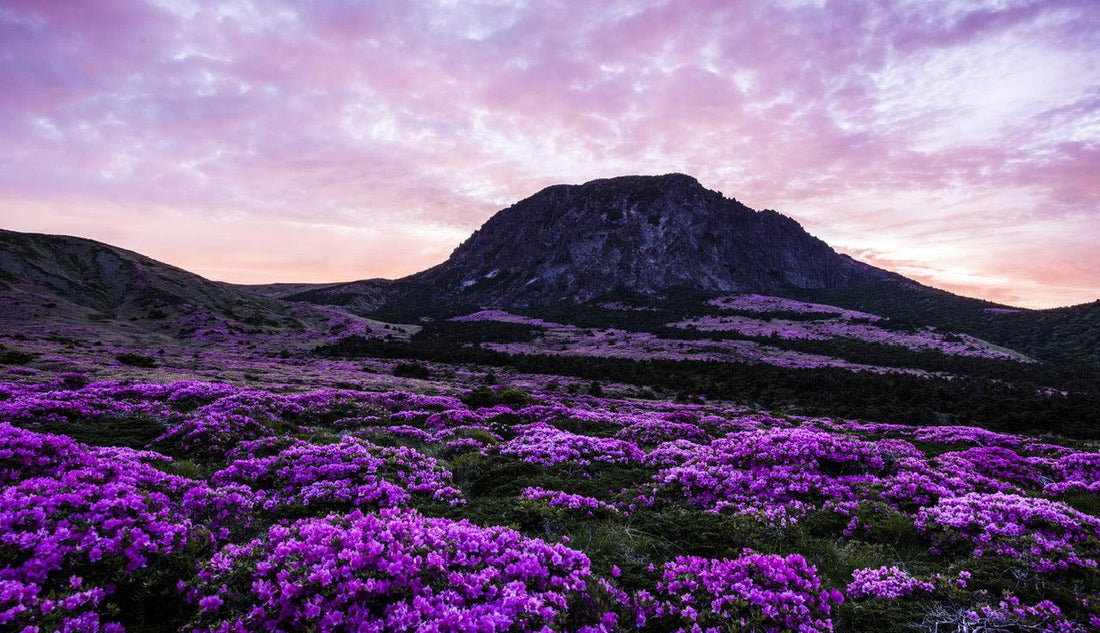Welcome to Jeju Island, one of South Korea's most stunning and unique destinations. Located off the southern coast of the Korean Peninsula, Jeju Island blusters an abundance of natural beauty, cultural landmarks, and delicious cuisine. From its towering volcanoes and pristine beaches to its charming villages and bustling cities, Jeju Island offers something for every type of traveler.

In this post, we'll explore some of the must-see tourist attractions on Jeju Island, including its brilliant waterfalls, caves, and museums. We'll also delve into the unique culture of Jeju Island, from its dialect and cuisine to its festivals and traditions. And of course, we'll take a closer look at the island's famous local products, including Jeju tangerines, fish, green tea, and more. Whether you're a first-time visitor to Jeju Island or a seasoned traveler, this post is sure to inspire your next adventure. So pack your bags and get ready to explore the wonders of Jeju Island!
Jeju Island is a paradise destination that offers a range of unique attractions and cultural experiences for visitors to explore. From gorgeous natural landscapes to vibrant festivals and events, there's something for everyone on this beautiful island.
How to Get There
There are several ways to get to Jeju Island. The most convenient and fastest way is by taking a flight from Seoul to Jeju. There are several airlines that operate flights from Seoul to Jeju, including Korean Air, Asiana Airlines, Jeju Air, and Jin Air. The flight from Seoul to Jeju takes approximately one hour.
If you prefer to travel by sea, you can take a ferry from several ports along the southern coast of the Korean peninsula. The ferry ride takes about 13 hours, but it can be a scenic and enjoyable way to travel if you have the time.
Once you arrive in Jeju, there are several transportation options to get around the island, including rental cars, taxis, buses, and private tours. The most convenient option is to rent a car or hire a private driver, especially if you want to explore the island at your own pace. If you prefer public transportation, there are several bus routes that operate around the island, but it may take longer to reach some of the more remote attractions.
Discover the Best Tourist Attractions and Festivals on Jeju Island
One of the most popular tourist attractions on Jeju Island is Hallasan National Park, home to South Korea's highest peak, Mount Halla (한라산). The park offers a variety of hiking trails for all levels of experience, with breathtaking views of the island's forests, lakes, and waterfalls. Another must-see attraction is Seongsan Ilchulbong (성산일출봉), a UNESCO World Heritage Site that features a stunning volcanic crater and is a popular spot to watch the sunrise.

In addition to these natural wonders, Jeju Island also has a rich cultural heritage that is celebrated through its festivals and events. The Jeju Fire Festival in March is a spectacle of fire-themed events, including a fire parade and performances, and traditional fire games. In late April to early May, visitors can enjoy the Jeju Canola Flower Festival, which celebrates the blooming of canola flowers across the island with cultural events and activities. The Jeju Food & Wine Festival in May is a must-visit for foodies, with a focus on local ingredients and traditional cooking methods.
Other popular festivals and events on Jeju Island include the Jeju International Wind Ensemble Festival in July and the Jeju Olle Walking Festival in November. Whether you're interested in music, food, or outdoor activities, there's always something exciting happening on this lively island.
Must-See Tourist Attractions on Jeju Island
Jeju Island is home to a wide range of natural and cultural attractions that are sure to delight visitors of all ages. Here are some of the top must-see tourist attractions:

Dol Hareubang
Dol Hareubang, also known as “stone grandfathers,” are large statues that can be found all over Jeju Island. They are believed to have the power to ward off evil spirits and protect the island’s residents. These iconic statues are a symbol of Jeju Island and have become a popular tourist attraction. Visitors can find Dol Hareubang statues in various sizes and shapes, from small souvenirs to towering sculptures. Don’t forget to take a photo with these fascinating statues during your trip!

Jeju Folk Village Museum
The Jeju Folk Village Museum is a living museum that showcases the traditional way of life on the island. Visitors can explore traditional houses, farms, and workshops, and learn about the island's unique culture and customs. The museum is also home to a range of cultural performances, including traditional music and dance..
Manjanggul Cave
Manjanggul Cave is one of the largest lava tubes in the world and a popular tourist attraction on Jeju Island. Visitors can explore the underground tunnels and gaze at the unique geological formations, including lava stalactites and lava shelves.

Jeju Loveland
Jeju Loveland is an adult-only theme park that features a variety of erotic sculptures and artworks. The park is intended to be a fun and lighthearted celebration of human sexuality, and is a popular destination for couples and honeymooners.
Jeju Olle Trail
This is a network of hiking trails that cover over 400 kilometers and take visitors along the island's coastline, through forests, and past historical sites. The trails are divided into sections, so visitors can choose the ones that suit their interests and fitness level.

By visiting this exceptional island, you can immerse yourself in its natural beauty, vibrant culture, and unique traditions. Plan your trip around one of these exciting festivals or events, or simply take in the island's remarkable landscapes and delicious cuisine. Whatever your interests, Jeju Island is sure to offer an unforgettable travel experience.
Discover the Fascinating Culture of Jeju Island
One of the most fascinating aspects of the island is its unique and distinct culture. With a history that dates back thousands of years, the island's culture has been shaped by its geography, climate, and isolation from the mainland. People visiting Jeju can experience this culture in a variety of ways, from visiting historical sites and museums to participating in local traditions and activities.
One of the most prominent features of Jeju's culture is its language. Jeju is home to its own dialect, which differs significantly from the Korean spoken on the mainland. Known as Jeju language or Jejueo, it is recognized as a distinct language by UNESCO and is considered an important part of the island's cultural heritage.
An important aspect of Jeju tradition is the Haenyeos (해녀) are female divers in Jeju Island who harvest seafood for a living. The tradition of Haenyeo has been passed down from generation to generation for over a century, with some estimating it to date back 1,500 years.
Haenyeos dive without any breathing equipment, relying solely on their ability to hold their breath and dive up to 20 meters deep for over two minutes at a time. They mainly catch abalone, octopus, sea urchins, and other shellfish. The Jeju Haenyeo Museum is a great place to learn more about the history and culture of these phenomenal women.
Another important aspect of Jeju's culture is its food. The island's cuisine is characterized by the use of local ingredients and traditional cooking methods, resulting in unique and flavorful dishes. Some must-try dishes include black pork, a local specialty, and fresh seafood caught in the surrounding waters.
Visitors to Jeju can also experience traditional music, dance, and art. Folk music and dance performances are held throughout the year, featuring colorful costumes and energetic movements. The island is also known for its intricate and beautiful embroidery, which can be seen in museums and shops within the island.
Overall, the local culture there is a rich and diverse tapestry of history, language, food, and art. Exploring these aspects of the island is a must for anyone looking to truly experience all that Korea’s most exotic place has to offer.
From Farm or Ocean to Table: Experiencing the Flavors of the Island
Jeju Island also boasts a rich culinary heritage that is uniquely its own. Whether you're a foodie or just looking to try something new, Jeju's local cuisine is sure to appease your taste buds.
One of the must-try foods in Jeju is the famous "black pork" (흑돼지), a specialty breed of pork that is raised on the island and known for its tender texture and rich flavor. Black pork can be enjoyed in a variety of dishes, including grilled pork belly (samgyeopsal, 삼겹살), spicy pork bulgogi (dweji bulgogi, 돼지불고기), and pork soup (gamjatang).

Jeju is also known for its fresh seafood, which can be enjoyed in a variety of dishes such as raw fish (hoe), grilled mackerel (godeungeo gui, 고등어구이), red tilefish (옥돔) and abalone porridge (jeonbokjuk). Hijiki (톳) can’t be farm raised and it is particularly popular among chefs.
In addition to its appetizing cuisine, Jeju is also home to a variety of unique and high-quality local products that make great souvenirs or gifts. Some of the most popular Jeju products include Jeju tangerines, Hallabong oranges, and green tea. Jeju Island is also known for its vinegars, including balsamic vinegar, green tangerine vinegar, and Hallabong orange vinegar, which are made using locally grown fruits and are believed to have various health benefits. Other Jeju products worth trying include fish sauce, traditional rice cakes (tteok), and millet wine.

Whether you're a food lover or just looking for some unique souvenirs, Jeju Island's local cuisine and products are sure to leave a lasting impression.
In conclusion, Korea’s biggest island is truly a hidden gem of South Korea that is waiting to be fully discovered. From its stunning natural attractions, rich cultural heritage, exciting festivals and events, to its unique local cuisine and products, there is something for everyone on this beautiful island. Whether you're an adventurous traveler seeking new experiences, or simply looking for a peaceful getaway, Jeju Island is definitely worth adding to your travel bucket list.
We hope that this guide has given you a glimpse of what Jeju Island has to offer and has inspired you to plan your own trip to this magical place. Don't forget to check out our featured Jeju products, including the refreshing Jeju Tangerine juice, savory Jeju Silver Hairtail fish (갈치), and tangy Jeju Balsamic Vinegar, to bring a taste of Jeju Island back home with you.
Thank you for reading, and we wish you happy travels!
Keywords: South Korea, travel, Jeju Island, Korean food, Korean culture, spicy pork bulgogi, grilled mackerel, tangerine juice, balsamic vinegar, silver hairtail


